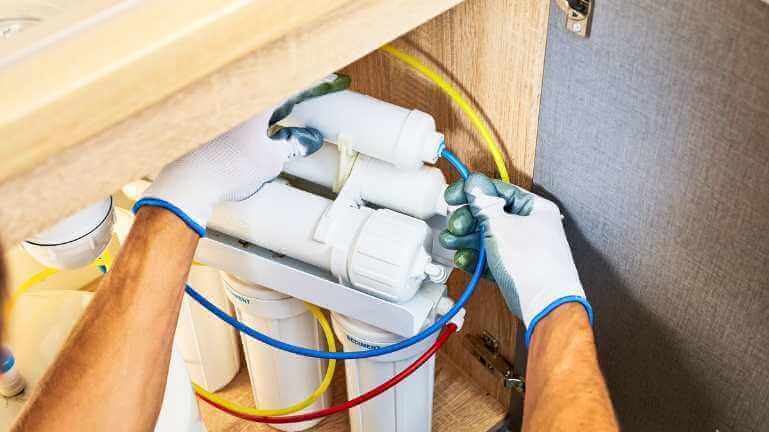Water filters ensure clean, safe drinking water by removing impurities. Regular replacement is vital. Signs like taste changes and decreased flow indicate when to replace them. Costs vary, but investing is crucial for water safety. Eco-friendly options help reduce environmental impact.
Key Takeaways:
- Water filters are essential for clean and safe drinking water, removing impurities and contaminants.
- Regular filter replacement is crucial for optimal performance and water quality.
- Signs indicating the need for replacement include changes in taste or smell, decreased water flow, and visible particles.
- Replacement costs vary by filter type, but the investment is worthwhile for water safety.
- Eco-friendly alternatives and recycling programs mitigate the environmental impact of discarded filters.
Understanding Water Filters
A water filter is a device that removes impurities and contaminants from water using a physical barrier, chemical process, or biological process. The primary function of a water filter is to provide clean, safe drinking water. However, the specific contaminants that a filter can remove depend on its type and technology.
There are various types of water filters available on the market, each designed to address specific water quality issues. Some common types include activated carbon filters, reverse osmosis filters, UV filters, and ceramic filters. Each of these filters works uniquely to remove different contaminants.
For instance, activated carbon filters work by adsorption, a chemical reaction where certain contaminants are attracted to activated carbon particles and removed from water. On the other hand, reverse osmosis filters use a semi-permeable membrane to remove contaminants. UV filters use ultraviolet light to kill bacteria and viruses, while ceramic filters use the small pore size of ceramic material to filter out contaminants.
| Type of Filter | Function |
|---|---|
| Activated Carbon Filters | Removes organic compounds and chlorine |
| Reverse Osmosis Filters | It removes a wide range of contaminants, including heavy metals |
| UV Filters | Kills bacteria and viruses |
| Ceramic Filters | Filters out bacteria, protozoa, and sediment |
The Importance of Clean Water
Clean water is vital for our health and well-being. It helps in maintaining hydration, aids in digestion, flushes out toxins, and contributes to skin health. Moreover, clean water is essential for cooking and cleaning purposes. Therefore, using a water filter to ensure the cleanliness of your water is of utmost importance.
Drinking contaminated water can lead to various health risks, such as waterborne diseases, gastrointestinal problems, and even certain types of cancer. Contaminants like lead, arsenic, and mercury can have serious health implications. Therefore, it’s crucial to ensure that your water is free from such harmful substances.
Water filters play a significant role in providing clean water by removing these contaminants. However, the effectiveness of a filter in removing contaminants depends on its type and quality. Therefore, it’s important to choose a filter that suits your specific water quality needs. For more information on the importance of clean water and the role of water filters, visit our Importance of Clean Water page.
Factors Affecting Water Filter Lifespan
The lifespan of a water filter depends on several factors. The quality of the water source is one of the primary factors. If the water source is highly contaminated, the filter will need to work harder and thus wear out faster. Similarly, the amount of water used also affects the lifespan of a filter. The more water you filter, the sooner you’ll need to replace the filter.
The type of water filter used also plays a significant role in determining its lifespan. For instance, activated carbon filters need to be replaced more frequently than reverse osmosis filters due to their different filtration methods. It’s important to understand these factors to ensure that your water filter is always functioning optimally.
Regular maintenance and timely replacement of water filters are crucial for their effective functioning. Failing to replace a filter can result in decreased performance and compromised water quality. For more information on factors affecting water filter lifespan, visit our water filter lifespan page.
| Factors | Impact on Lifespan |
|---|---|
| Quality of the water source | Poor-quality water can shorten the filter’s lifespan |
| Amount of water usage | Higher water usage can lead to frequent filter replacement |
| Type of water filter used | Different filters have different lifespans |
Signs That Your Water Filter Needs Replacement
Knowing when to replace your water filter is crucial for maintaining the quality of your water. Several signs indicate a need for replacement. Changes in the taste or smell of your water can be a clear indication that your filter is no longer working effectively. If your water starts tasting metallic or has an odd smell, it’s time to check your filter.

Another sign is a decrease in water flow. If your water flow has significantly slowed down, it could mean that your filter is clogged and needs replacement. Visible particles in your water are also a clear sign of a failing filter. If you notice any of these signs, it’s best to replace your filter immediately to ensure the safety of your water.
Remember, these are just signs, and the absence of them does not necessarily mean your filter is functioning optimally. It’s always best to follow the manufacturer’s recommendations on filter replacement. For more information on signs indicating the need for filter replacement, visit our water filter replacement signs page.
General Guidelines for Replacing Different Types of Water Filters
Replacing a water filter is a straightforward process, but the steps can vary depending on the type of filter. For pitcher filters, the replacement process usually involves simply pulling out the old filter and inserting a new one. Faucet filters may require unscrewing the old filter and screwing on a new one. Under-sink filters and whole-house filters may require more steps, including turning off the water supply and using a wrench to remove the old filter.
It’s important to follow the manufacturer’s instructions when replacing your water filter. Incorrect installation can lead to leaks, poor water quality, and even damage to your water system. Always make sure to flush the new filter before use to remove any carbon dust or other residues.
Remember, regular replacement of your water filter is crucial for maintaining the quality of your water. For more information on replacing different types of water filters, visit our replacing water filters page.
The Process of Replacing a Water Filter
Replacing a water filter involves several steps. First, you need to turn off the water supply to the filter. Next, you need to remove the old filter. This can usually be done by unscrewing or pulling out the filter. Once the old filter is removed, you can insert the new filter. Make sure to secure the new filter properly to prevent leaks.
After installing the new filter, it’s important to flush it. This involves running water through the filter for a certain amount of time to remove any carbon dust or other residues. Once the filter is flushed, you can turn the water supply back on and start using your filtered water.
Remember, safety is important when replacing a water filter. Always follow the manufacturer’s instructions and take the necessary precautions. For more information on the process of replacing a water filter, visit our replacement water filter process page.
The Cost of Replacing Water Filters
The cost of replacing a water filter can vary depending on the type of filter and the brand. On average, a replacement filter for a pitcher or faucet filter can cost between $10 and $50. Under-sink and whole-house filters can be more expensive, with replacement filters costing anywhere from $50 to $200 or more.
While the upfront cost of replacing a water filter can seem high, it’s important to consider the long-term cost benefits. Regularly replacing your filter can help prevent costly repairs or replacements to your water system. Moreover, it can help ensure the safety of your water, potentially saving you from health-related expenses.
Remember, the cost of a replacement filter is a small price to pay for the safety and quality of your water. For more information on the cost of replacing water filters, visit our cost of replacing water filters page.
Environmental Impact of Water Filters
While water filters play a crucial role in providing clean water, they also have an environmental impact. Discarded filters can contribute to landfill waste and pollution. However, many manufacturers are now offering eco-friendly alternatives and recycling programs for their filters.
Some filters are made from recyclable materials, reducing their environmental impact. Moreover, some companies offer take-back programs where they collect used filters for recycling. By choosing such options, you can contribute to a more sustainable environment.
Remember, every small step counts when it comes to protecting our environment. By choosing eco-friendly water filters and participating in recycling programs, you can play your part in reducing environmental pollution. For more information on the environmental impact of water filters, visit our environmental impact of water filters page.
Conclusion
In summary, how often you need to change your water filter varies based on factors like filter type, water quality, and usage patterns. Typically, it’s advised to swap out filters every six months to keep them performing well and effectively removing contaminants. Regular replacements not only ensure your drinking water stays safe, but they also help your filtration system run efficiently. Following the manufacturer’s recommendations and paying attention to any indicators will help you determine when it’s time for a filter change, promoting the health of both you and your filtration device.
Frequently Asked Question
What is a water filter?
A water filter is a device that removes impurities and contaminants from water using a physical barrier, chemical process, or biological process.
Why is clean water important?
Clean water is vital for our health and well-being. It helps in maintaining hydration, aids in digestion, flushes out toxins, and contributes to skin health.
How often should I replace my water filter?
The frequency of filter replacement can vary depending on the quality of your water source, the amount of water usage, and the type of filter used. However, it’s always best to follow the manufacturer’s recommendations.
How do I know when to replace my water filter?
Changes in the taste or smell of your water, a decrease in water flow, and visible particles in your water are some signs that your filter needs replacement.
What is the environmental impact of water filters?
Discarded filters can contribute to landfill waste and pollution. However, many manufacturers are now offering eco-friendly alternatives and recycling programs for their filters.

Ross Walters, an Electrical supplies and Water Appliances specialist, shares his extensive expertise on top platforms. With a focus on empowering professionals and enthusiasts, Ross delivers up-to-date insights and practical advice. His commitment to staying abreast of industry trends establishes him as a trusted source for navigating the complexities of electrical systems and water appliances.

